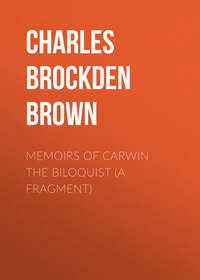 полная версия
полная версияOrmond; Or, The Secret Witness. Volume 2 (of 3)
"He has a family and children, I suppose?"
"O yes. Why, don't you know Miss Hetty and Miss Betsy? There again! I was going to tell the name, that he said I must not tell."
Constantia saw that the secret might be easily discovered, but she forbore. She disdained to take advantage of this messenger's imagined simplicity. She dismissed him with some small addition to his demand, and with a promise always to employ him in this way.
By this mode Ormond had effectually concealed himself. The lady's conjectures, founded on this delusive information, necessarily wandered widely from the truth. The observations that he had made during this visit afforded his mind considerable employment. The manner in which this lady had sustained so cruel a reverse of fortune, the cheerfulness with which she appeared to forego all the gratifications of affluence, the skill with which she selected her path of humble industry, and the steadiness with which she pursued it, were proofs of a moral constitution, from which he supposed the female sex to be debarred. The comparison was obvious between Constantia and Helena, and the result was by no means advantageous to the latter. Was it possible that such a one descended to the level of her father's apprentice? That she sacrificed her honour to a wretch like that? This reflection tended to repress the inclination he would otherwise have felt for cultivating her society, but it did not indispose him to benefit her in a certain way.
On his next visit to his "Bella Siciliana," as he called her, he questioned her as to the need in which she might stand of the services of a seamstress; and being informed that they were sometimes wanted, he recommended Miss Acworth to her patronage. He said that he had heard her spoken of in favourable terms by the gossips at Melbourne's. They represented her as a good girl, slenderly provided for, and he wished that Helena would prefer her to all others.
His recommendation was sufficient. The wishes of Ormond, as soon as they became known, became hers. Her temper made her always diligent in search of novelty. It was easy to make work for the needle. In short, she resolved to send for her the next day. The interview accordingly took place on the ensuing morning, not without mutual surprise, and, on the part of the fair Sicilian, not without considerable embarrassment.
This circumstance arose from their having changed their respective names, though from motives of a very different kind. They were not strangers to each other, though no intimacy had ever subsisted between them. Each was merely acquainted with the name, person, and general character of the other. No circumstance in Constantia's situation tended to embarrass her. Her mind had attained a state of serene composure, incapable of being ruffled by an incident of this kind. She merely derived pleasure from the sight of her old acquaintance. The aspect of things around her was splendid and gay. She seemed the mistress of the mansion, and her name was changed. Hence it was unavoidable to conclude that she was married.
Helena was conscious that appearances were calculated to suggest this conclusion. The idea was a painful one. She sorrowed to think that this conclusion was fallacious. The consciousness that her true condition was unknown to her visitant, and the ignominiousness of that truth, gave an air of constraint to her behaviour, which Constantia ascribed to a principle of delicacy.
In the midst of reflections relative to herself, she admitted some share of surprise at the discovery of Constantia in a situation so inferior to that in which she had formerly known her. She had heard, in general terms of the misfortunes of Mr Dudley, but was unacquainted with particulars; but this surprise, and the difficulty of adapting her behaviour to circumstances, was only in part the source of her embarrassment, though by her companion it was wholly attributed to this cause. Constantia thought it her duty to remove it by open and unaffected manners. She therefore said, in a sedate and cheerful tone, "You see me, Madam, in a situation somewhat unlike that in which I formerly was placed. You will probably regard the change as an unhappy one; but, I assure you, I have found it far less so than I expected. I am thus reduced not by my own fault. It is this reflection that enables me to conform to it without a murmur. I shall rejoice to know that Mrs. Eden is as happy as I am."
Helena was pleased with this address, and returned an answer full of sweetness. She had not in her compassion for the fallen, a particle of pride. She thought of nothing but the contrast between the former situation of her visitant and the present. The fame of her great qualities had formerly excited veneration, and that reverence was by no means diminished by a nearer scrutiny. The consciousness of her own frailty meanwhile diffused over the behaviour of Helena a timidity and dubiousness uncommonly fascinating. She solicited Constantia's friendship in a manner that showed she was afraid of nothing but denial. An assent was eagerly given, and thenceforth a cordial intercourse was established between them.
The real situation of Helena was easily discovered. The officious person who communicated this information, at the same time cautioned Constantia against associating with one of tainted reputation. This information threw some light upon appearances. It accounted for that melancholy which Helena was unable to conceal. It explained that solitude in which she lived, and which Constantia had ascribed to the death or absence of her husband. It justified the solicitous silence she had hitherto maintained respecting her own affairs, and which her friend's good sense forbade her to employ any sinister means of eluding.
No long time was necessary to make her mistress of Helena's character. She loved her with uncommon warmth, though by no means blind to her defects. She formed no expectations from the knowledge of her character, to which this intelligence operated as a disappointment. It merely excited her pity, and made her thoughtful how she might assist her in repairing this deplorable error.
This design was of no ordinary magnitude. She saw that it was previously necessary to obtain the confidence of Helena. This was a task of easy performance. She knew the purity of her own motives and the extent of her powers, and embarked in this undertaking with full confidence of success. She had only to profit by a private interview, to acquaint her friend with what she knew, to solicit a complete and satisfactory disclosure, to explain the impressions which her intelligence produced, and to offer her disinterested advice. No one knew better how to couch her ideas in words suitable to the end proposed by her in imparting them.
Helena was at first terrified, but the benevolence of her friend quickly entitled her to confidence and gratitude that knew no limits. She had been deterred from unveiling her heart by the fear of exciting contempt or abhorrence; but when she found that all due allowances were made, – that her conduct was treated as erroneous in no atrocious or inexpiable degree, and as far front being insusceptible of remedy, – that the obloquy with which she had been treated found no vindicator or participator in her friend, her heart was considerably relieved. She had been long a stranger to the sympathy and intercourse of her own sex. Now this good, in its most precious form, was conferred upon her, and she experienced an increase rather than diminution of tenderness, in consequence of her true situation being known.
She made no secret of any part of her history. She did full justice to the integrity of her lover, and explained the unforced conditions on which she had consented to live with him. This relation exhibited the character of Ormond in a very uncommon light. His asperities wounded, and his sternness chilled. What unauthorised conceptions of matrimonial and political equality did he entertain! He had fashioned his treatment of Helena on sullen and ferocious principles. Yet he was able, it seemed, to mould her, by means of them, nearly into the creature that he wished. She knew too little of the man justly to estimate his character. It remained to be ascertained whether his purposes were consistent and upright, or were those of a villain and betrayer.
Meanwhile what was to be done by Helena? Marriage had been refused op plausible pretences. Her unenlightened understanding made her no match for her lover. She would never maintain her claim to nuptial privileges in his presence, or, if she did, she would never convince him of their validity.
Were they indeed valid? Was not the disparity between them incurable? A marriage of minds so dissimilar could only be productive of misery immediately to him, and, by a reflex operation, to herself. She could not be happy in a union that was the source of regret to her husband. Marriage, therefore, was not possible, or if possible, was not, perhaps, to be wished. But what was the choice that remained?
To continue in her present situation was not to be endured. Disgrace was a dæmon that would blast every hope of happiness. She was excluded from all society but that of the depraved. Her situation was eminently critical. It depended, perhaps, on the resolution she should now form whether she would be enrolled among the worst of mankind. Infamy is the worst of evils. It creates innumerable obstructions in the paths of virtue. It manacles the hand, and entangles the feet that are active only to good. To the weak it is an evil of much greater magnitude. It determines their destiny; and they hasten to merit that reproach, which, at first it may be, they did not deserve.
This connection is intrinsically flagitious. Helena is subjected by it to the worst ills that are incident to humanity, the general contempt of mankind, and the reproaches of her own conscience. From these there is but one method from which she can hope to be relieved. The intercourse must cease.
It wad easier to see the propriety of separation, than to project means for accomplishing it. It was true that Helena loved; but what quarter was due to this passion when divorced from integrity? Is it not in every bosom a perishable sentiment? Whatever be her warmth, absence will congeal it. Place her in new scenes, and supply her with new associates. Her accomplishments will not fail to attract votaries. From these she may select a conjugal companion suitable to her mediocrity of talents.
But alas! what power on earth can prevail on her to renounce Ormond? Others may justly entertain this prospect, but it must be invisible to her. Besides, is it absolutely certain that either her peace of mind or her reputation will be restored by this means? In the opinion of the world her offences cannot, by any perseverance in penitence, be expiated. She will never believe that separation will exterminate her passion. Certain it is that it will avail nothing to the re-establishment of her fame. But if it were conducive to these ends, how chimerical to suppose that she will ever voluntarily adopt it! If Ormond refuse his concurrence, there is absolutely an end to hope. And what power on earth is able to sway his determinations? At least, what influence was it possible for her to obtain over them?
Should they separate, whither should she retire? What mode of subsistence should she adopt? She has never been accustomed to think beyond the day. She has eaten and drank, but another has provided the means. She scarcely comprehends the principle that governs the world, and in consequence of which nothing can be gained but by giving something in exchange for it. She is ignorant and helpless as a child, on every topic that relates to the procuring of subsistence. Her education has disabled her from standing alone.
But this was not all. She must not only be supplied by others, but sustained in the enjoyment of a luxurious existence. Would you bereave her of the gratifications of opulence? You had better take away her life. Nay, it would ultimately amount to this. She can live but in one way.
At present she is lovely, and, to a certain degree, innocent; but expose her to the urgencies and temptations of want, let personal pollution be the price set upon the voluptuous affluences of her present condition, and it is to be feared there is nothing in the contexture of her mind to hinder her from making the purchase. In every respect therefore the prospect was an hopeless one, – so hopeless, that her mind insensibly returned to the question which she had at first dismissed with very slight examination, – the question relative to the advantages and probabilities of marriage. A more accurate review convinced her that this was the most eligible alternative. It was, likewise, most easily effected. The lady, of course, would be its fervent advocate. There did not want reasons why Ormond should finally embrace it. In what manner appeals to his reason of his passion might most effectually be made she knew not.
Helena was not qualified to be her own advocate. Her unhappiness could not but be visible to Ormond. He had shown himself attentive and affectionate. Was it impossible that, in time, he should reason himself into a spontaneous adoption of this scheme? This, indeed, was a slender foundation for hope, but there was no other on which she could build.
Such were the meditations of Constantia on this topic. She was deeply solicitous for the happiness of her friend. They spent much of their time together. The consolations of her society were earnestly sought by Helena; but to enjoy them, she was for the most part obliged to visit the former at her own dwelling. For this arrangement, Constantia apologized by saying, "You will pardon my requesting you to favour me with your visits, rather than allowing you mine. Every thing is airy and brilliant within these walls. There is, besides, an air of seclusion and security about you that is delightful. In comparison, my dwelling is bleak, comfortless, and unretired, but my father is entitled to all my care. His infirmity prevents him from amusing himself, and his heart is cheered by the mere sound of my voice, though not addressed to him. The mere belief of my presence seems to operate as an antidote to the dreariness of solitude; and, now you know my motives, I am sure you will not only forgive but approve of my request."
CHAPTER V
When once the subject had been introduced, Helena was prone to descant upon her own situation, and listened with deference to the remarks and admonitions of her companion. Constantia did not conceal from her any of her sentiments. She enabled her to view her own condition in its true light, and set before her the indispensable advantages of marriage, while she, at the same time, afforded her the best directions as to the conduct she ought to pursue in order to effect her purpose.
The mind of Helena was thus kept in a state of perpetual and uneasy fluctuation. While absent from Ormond, or listening to her friend's remonstrances, the deplorableness of her condition arose in its most disastrous hues before her imagination. But the spectre seldom failed to vanish at the approach of Ormond. His voice dissipated every inquietude.
She was not insensible of this inconstancy. She perceived and lamented her own weakness. She was destitute of all confidence in her own exertions. She could not be in the perpetual enjoyment of his company. Her intervals of tranquillity, therefore, were short, while those of anxiety and dejection were insupportably tedious. She revered, but believed herself incapable to emulate the magnanimity of her monitor. The consciousness of inferiority, especially in a case like this, in which her happiness so much depended on her own exertions, excited in her the most humiliating sensations.
While indulging in fruitless melancholy, the thought one day occurred to her, why may not Constantia be prevailed upon to plead my cause? Her capacity and courage are equal to any undertaking. The reasonings that are so powerful in my eyes, would they he trivial and futile in those of Ormond? I cannot have a more pathetic and disinterested advocate.
This idea was cherished with uncommon ardour. She seized the first opportunity that offered itself to impart it to her friend. It was a wild and singular proposal, and was rejected at the first glance. This scheme, so romantic and impracticable as it at first seemed, appeared to Helena in the most plausible colours. She could not bear to relinquish her new-born hopes. She saw no valid objection to it. Every thing was easy to her friend, provided her sense of duty and her zeal could be awakened. The subject was frequently suggested to Constantia's reflections. Perceiving the sanguineness of her friend's confidence, and fully impressed with the value of the end to be accomplished, she insensibly veered to the same opinion. At least the scheme was worthy of a candid discussion before it was rejected.
Ormond was a stranger to her. His manners were repulsive and austere. She was a mere girl. Her personal attachment to Helena was all that she could plead in excuse for taking part in her concerns. The subject was delicate. A blunt and irregular character like Ormond might throw an air of ridicule over the scene. She shrunk from the encounter of a boisterous and manlike spirit.
But were not these scruples effeminate and puerile? Had she studied so long in the school of adversity, without conviction of the duty of a virtuous independence? Was she not a rational being, fully imbued with the justice of her cause? Was it not ignoble to refuse the province of a vindicator of the injured, before any tribunal, however tremendous or unjust? And who was Ormond, that his eye should inspire terror?
The father or brother of Helena might assume the office without indecorum. Nay, a mother or sister might not be debarred from it. Why then should she, who was actuated by equal zeal, and was engaged, by ties stronger than consanguinity, in the promotion of her friend's happiness. It is true she did not view the subject in the light in which it was commonly viewed by brothers and parents. It was not a gust of rage that should transport her into his presence. She did not go to awaken his slumbering conscience, and to abash him in the pride of guilty triumph, but to rectify deliberate errors, and to change his course by the change of his principles. It was her business to point out to him the road of duty and happiness, from which he had strayed with no sinister intentions. This was to be done without raving and fury; but with amicable soberness, and in the way of calm and rational remonstrance. Yet, there were scruples that would not be shut out, and continually whispered to her, "What an office is this for a girl and a stranger to assume!"
In what manner should it be performed? Should an interview be sought, and her ideas be explained without confusion or faltering, undismayed by ludicrous airs or insolent frowns. But this was a point to be examined. Was Ormond capable of such behaviour? If he were, it would be useless to attempt the reformation of his errors. Such a man is incurable and obdurate. Such a man is not to be sought as the husband of Helena; but this, surely, is a different being.
The medium through which she had viewed his character was an ample one, but might not be very accurate. The treatment which Helena had received from him, exclusive of his fundamental error, betokened a mind to which she did not disdain to be allied. In spite of his defects, she saw that their elements were more congenial, and the points of contact between this person and herself more numerous than between her and Helena, whose voluptuous sweetness of temper, and mediocrity of understanding excited in her bosom no genuine sympathy.
Every thing is progressive in the human mind. When there is leisure to reflect, ideas will succeed each other in a long train, before the ultimate point be gained. The attention must shift from one side to the other of a given question many times before it settles. Constantia did not form her resolutions in haste; but when once formed, they were exempt from fluctuation. She reflected before she acted, and therefore acted with consistency and vigour. She did not apprize her friend of her intention. She was willing that she should benefit by her interposition, before she knew it was employed.
She sent her Lucy with a note to Ormond's house. It was couched in these terms: —
"Constantia Dudley requests an interview with Mr. Ormond. Her business being of some moment, she wishes him to name an hour when most disengaged."
An answer was immediately returned that at three o'clock, in the afternoon, he should be glad to see her.
This message produced no small surprise in Ormond. He had not withdrawn his notice from Constantia, and had marked, with curiosity and approbation, the progress of the connexion between the two women. The impressions which he had received from the report of Helena were not dissimilar to those which Constantia had imbibed, from the same quarter, respecting himself; but he gathered from them no suspicion of the purpose of a visit. He recollected his connection with Craig. This lady had had an opportunity of knowing that some connection subsisted between them. He concluded that some information or inquiry respecting Craig might occasion this event. As it was, it gave him considerable satisfaction. It would enable him more closely to examine one, with respect to whom he entertained great curiosity.
Ormond's conjecture was partly right. Constantia did not forget her having traced Craig to this habitation. She designed to profit by the occasion which this circumstance afforded her, of making some inquiry respecting Craig, in order to introduce, by suitable degrees, a more important subject.
The appointed hour having arrived, he received her in his drawing-room. He knew what was due to his guest. He loved to mortify, by his negligence, the pride of his equals and superiors, but a lower class had nothing to fear from his insolence. Constantia took the seat that was offered to her, without speaking. She had made suitable preparations for this interview, and her composure was invincible. The manners of her host were by no means calculated to disconcert her. His air was conciliating and attentive.
She began with naming Craig, as one known to Ormond, and desired to be informed of his place of abode. She was proceeding to apologise for this request, by explaining, in general terms, that her father's infirmities prevented him from acting for himself, that Craig was his debtor to a large amount, that he stood in need of all that justly belonged to him, and was in pursuit of some means of tracing Craig to his retreat. Ormond interrupted her, examining, at the same time, with a vigilance somewhat too unsparing, the effects which his words should produce upon her: —
"You may spare yourself the trouble of explaining. I am acquainted with the whole affair between Craig and your family. He has concealed from me nothing. I know all that has passed between you."
In saying this, Ormond intended that his looks and emphasis should convey his full meaning. In the style of her comments he saw none of those corroborating symptoms that he expected: —
"Indeed! He has been very liberal of his confidence. Confession is a token of penitence; but, alas! I fear he has deceived you. To be sincere was doubtless his true interest, but he is too much in the habit of judging superficially. If he has told you all, there is, indeed, no need of explanation. This visit is, in that case, sufficiently accounted for. Is it in your power, Sir, to inform us whither he has gone?"
"For what end should I tell you? I promise you you will not follow him. Take my word for it, he is totally unworthy of you. Let the past be no precedent for the future. If you have not made that discovery yourself, I have made it for you. I expect at least to be thanked for my trouble."
This speech was unintelligible to Constantia. Her looks betokened a perplexity unmingled with fear or shame.
"It is my way," continued he, "to say what I think. I care little for consequences. I have said that I know all. This will excuse me for being perfectly explicit. That I am mistaken is very possible; but I am inclined to place that matter beyond the reach of a doubt. Listen to me, and confirm me in the opinion I have already formed of your good sense, by viewing, in a just light, the unreservedness with which you are treated. I have something to tell, which, if you are wise, you will not be offended at my telling so roundly. On the contrary you will thank me, and perceive that my conduct is a proof of my respect for you. The person whom you met here is named Craig, but, as he tells me, is not the man you look for. This man's brother – the partner, of your father, and, as he assured me, your own accepted and illicitly-gratified lover – is dead."







